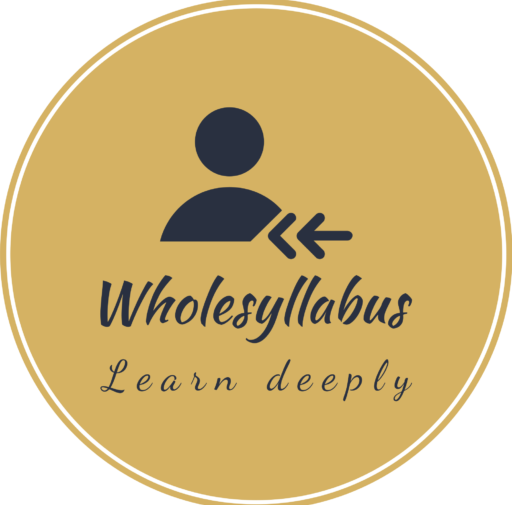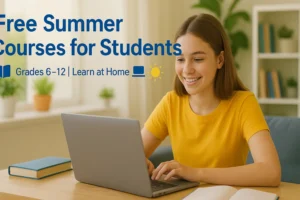The smartest students aren’t the ones glued to textbooks year-round. They’re the ones who use their downtime to explore stuff they actually care about—like game design, creative writing, even Python or psychology. That’s where free summer courses come in.
Many parents don’t realize just how many high-quality, free online platforms now cater to middle and high school students. We’re talking Khan Academy, Code.org, HarvardX, and even MIT—all offering self-paced courses that cover way more than just math and science.
Here’s what most parents miss: These courses aren’t just for gifted kids or future coders. They’re built for every kind of learner—whether you’re trying to catch up, get ahead, or just explore a new interest before 10th grade hits hard.
Not sure what’s appropriate for your teen’s grade level? We’ve broken it down in this summer planner by grade (9–12)
In this post, I’ve put together the best places to find free courses this summer for grades 6–12, sorted by subject, platform, and grade level. There’s even a quick comparison table to make choosing easier.
Why Take Free Online Courses This Summer?
Free online courses give students in grades 6–12 a way to stay sharp, explore interests, or get ahead—on their own terms.
✅ Quick Benefits:
- No burnout: Just 30 minutes a day helps prevent summer learning loss.
- Learn cool stuff: Coding, creative writing, game design—not your usual school subjects.
- Get ahead: Some use Khan Academy or edX to prep for high school or AP classes.
- Super flexible: Most courses are self-paced. Stop anytime, no stress.
Real story from Reddit:
“I started Code.org’s game design course last July—ended up building my own game by the end of summer.”
— r/learnprogramming
Want to understand how full-time online education works for K–12 students across the U.S. — including tuition-free options? 👉 Explore Our Full Guide to Online K–12 Schooling in 2025.
Best Free Online Course Platforms for Grades 6–12
What are the best free online courses for students in grades 6–12?
Several trusted platforms offer free courses in subjects like math, science, coding, and writing. Many are self-paced, age-appropriate, and completely free—no credit card required.
Here’s the thing—there’s no “one best” platform for everyone. Some students want to dive into SAT prep; others want to learn how to animate a cartoon or build a game in Scratch. So instead of ranking them, I made a quick comparison chart based on subjects, grade range, and access.
Tip: Want certificates? Some platforms offer them for free, while others charge for official ones—but all the learning itself is usually free.
Summer courses are a great way to boost credits, but if you’re ready to graduate, explore online diploma programs that offer flexible pacing year-round.
Quick Comparison: Top Free Learning Platforms
| Platform | Subjects | Grades | Free? | Certificate |
|---|---|---|---|---|
| Khan Academy | Math, Science, History, SAT | 6–12 | ✅ 100% Free | ❌ No cert |
| Code.org | Coding, Game Dev | 6–10 | ✅ 100% Free | ❌ No cert |
| Coursera (audit) | Tech, Business, College Prep | 9–12 | ✅ Free (audit mode) | ✅ Some |
| MIT OCW | Computer Science, Physics | 11–12 | ✅ 100% Free | ❌ No cert |
| Create & Learn | Python, AI, Robotics | 6–10 | ✅ Free intro classes | ✅ Paid cert |
| edX (audit) | STEM, Humanities, AP courses | 9–12 | ✅ Free (audit mode) | ✅ Some |
Before diving into any course, it helps to have a solid summer prep strategy to stay focused and avoid burnout.
A Few Notes from Real Students & Parents
One parent on Quora shared:
“My daughter did a HarvardX free course on climate science during the summer between 10th and 11th grade—it sparked a whole career interest. We didn’t pay a dime.”
A student on Reddit posted in r/learnprogramming:
“Code.org was honestly more fun than school. I finished the entire animation track over 2 weeks during summer just for fun. Now I’m learning Unity.”
Which Platform Should You Start With?
- Need general academic support? 👉 Try Khan Academy
- Into tech or games? 👉 Code.org or Create & Learn
- Want something college-level? 👉 Coursera or edX (but audit for free)
- Advanced STEM learners? 👉 MIT OpenCourseWare
In my opinion, you don’t have to overthink it—just pick one platform that looks fun or useful and stick with it for 2 weeks. Most kids lose interest because they’re overwhelmed with choices, not because the courses are boring.
Are There Online Courses for Middle Schoolers Too?
Absolutely — and honestly, this is where a lot of parents get surprised. Most people assume online learning is all about high school or college-level content, but there’s a ton of high-quality, age-appropriate stuff out there for middle school students, especially grades 6 to 8.
Let’s say your 7th grader is into animation or space science — you don’t need to wait till high school to get them started. Platforms like Khan Academy, PBS LearningMedia, and Create & Learn are loaded with free courses designed just for this age group.
Middle School-Friendly Platforms Worth Checking Out
| Platform | Subjects | Best for Grades | Free? |
|---|---|---|---|
| Khan Academy | Math, Reading, Science, History | 6–8 | ✅ 100% Free |
| Create & Learn | Python, AI, Game Design | 6–8 | ✅ Free Intro Courses |
| Code.org | Computer Science, Animation | 6–8 | ✅ Totally Free |
| PBS LearningMedia | Science, Social Studies, Arts | 6–8 | ✅ Free |
| Quill.org | Grammar, Writing Skills | 6–8 | ✅ Free with login |
These sites aren’t just “dumped-down” versions of high school lessons. They’re designed with middle school attention spans, learning levels, and creativity in mind.
💻 Pro tip: Taking online courses? Make sure your student has a reliable laptop. Check out our Best Affordable Chromebooks for Students — perfect for summer learning and way cheaper than most laptops.
Disclosure: This post contains affiliate links. If you buy something through these links, I may earn a small commission at no extra cost to you.
Real Parent Example from Reddit
“My son’s 6th grade summer was rough—he hated reading. But I found this interactive history series on PBS Learning and it totally hooked him. He started asking questions about ancient Egypt at dinner! It felt like a miracle.”
— Reddit parent in r/Parenting
Here’s another post where a Redditor mentioned that Code.org’s Hour of Code turned into a full-on obsession with building mini-games. That’s the kind of spark middle schoolers thrive on—hands-on, bite-sized, and fun.
In My Opinion…
If you have a middle schooler sitting around this summer with way too much screen time, this is your golden window. Sign them up for a short AI or storytelling class. Let them explore, fail, retry, and ask questions. There’s no report card involved — just growth.
Pro Tip: Choose platforms that offer bite-sized modules — younger students engage better when lessons are under 15 minutes with visuals or interactivity.
Credible Programs to Explore
- Khan Academy Middle School Courses
- PBS LearningMedia for Grades 6–8
- Create & Learn Python Class for Kids
- Quill Writing Practice
Loved leveling up in math this summer?
Consider teaching it next!
Find out how teens can tutor online in our detailed post: Online Tutoring Jobs for Teens.
How to Choose the Right Online Course for Your Grade Level
If you’re staring at 20+ free course options and thinking, “Uhh, where do I even start?” — you’re not alone. Choosing the right course isn’t just about what’s popular; it’s about what actually fits your grade level, schedule, and goals.
Step 1: Know Your Learning Style
Some students thrive on self-paced freedom, others need more structure and check-ins.
- If your student is independent and prefers flexibility, I’d recommend platforms like Khan Academy or MIT OpenCourseWare.
- If they need more hand-holding or live sessions, something like Connections Academy’s Summer School or Create & Learn’s coding bootcamps might work better.
“My son tried a Coursera course last summer and dropped it in a week — turns out he needed deadlines. We switched to a K12.com instructor-led course, and he actually finished it.” — Parent on Quora
Step 2: Match the Grade Level (But Don’t Be Afraid to Explore Ahead)
- Grades 6–8: Look for gamified, interactive lessons. Tools like Code.org, Quill, and PBS LearningMedia are built for middle school brains (short attention spans included).
- Grades 9–12: Try pre-college content — AP-level science on edX, or writing with a HarvardX course. Don’t shy away from advanced material — as long as they’re curious, they can usually handle it.
Step 3: Check the Time Commitment
Some free courses take just 1–2 hours per week. Others run like full summer classes with weekly assignments.
- Quick & casual: Try Khan Academy’s summer math plans
- More structured: Pearson Online Academy or Connections Academy offer formal credit-bearing summer programs (great for students who failed a class or want GPA boosts)
Pro tip: Some sites let you preview the syllabus before enrolling. Always do this if your student tends to lose motivation midway through!
Step 4: Align the Course with Real Goals
Before signing up, ask:
- Is the goal credit recovery?
- Learning something new (like coding or psychology)?
- College prep or SAT practice?
Each course fits a purpose — but not every course fits every student.
My takeaway?
Don’t force a course on your kid just because it sounds prestigious. Let them choose something they’re actually curious about. Whether it’s animation, algebra, or marine biology—interest is what keeps them coming back.
Can Free Online Courses Help You Earn Credit?
Short answer? Sometimes. But not always.
Most free platforms like Khan Academy or MIT OpenCourseWare are meant for enrichment, not credit. That means you can learn a ton—but your school likely won’t count it toward graduation.
Reddit student quote:
“I took AP Bio on edX over the summer. It didn’t give me credit, but it made the real class way easier.”
— r/APStudents
Want Credit? Look for Accredited Programs
If you’re aiming for actual school credit, try:
- K12 Online Summer School – Offers accredited classes for grades 6–12, including credit recovery
- Connections Academy – Through Pearson Online Academy, offers summer credit options
Just know: these aren’t always 100% free—but they are legit.
If you’re wondering why summer learning even matters, here’s what most parents miss: why summer is a golden window for students.
Quick Tip:
Before enrolling, ask your school counselor:
- Is the program accredited?
- Will my school accept outside credits?
I’d recommend using free courses to explore new skills—then go for credit through an approved provider if needed.
Final Tips to Make the Most of Summer Learning
Here are some quick tips to help students — and parents — get the most out of free summer courses
Try One Thing at a Time
There’s no need to sign up for five different subjects. Pick one course you’re genuinely curious about—something that doesn’t feel like school. That’s what helps students actually finish.
A 10th grader on Quora said they started a free coding course just out of boredom but ended up building a basic game over the summer. Small start, big impact.
Use a Basic Tracker or Calendar
You don’t need fancy software. Even a sticky note on your wall with three checkboxes per week can work. The point is just to stay on track without overthinking it.
Don’t Just Stick to School Subjects
Summer is the time to explore. Look beyond math and science. There are free courses in:
- Animation and video editing
- AI and robotics for teens
- Podcast creation and music production
- Even personal finance or entrepreneurship
You never know what skill might spark something bigger.
Stay Consistent — Not Intense
Three hours a week is plenty. That could be an hour on Monday, one on Wednesday, and one on Saturday. You’ll still finish an entire short course before school starts again—and it won’t eat up your break.
My Takeaway
The goal isn’t to recreate the classroom. It’s to give students a way to keep learning on their own terms—without grades, without pressure. And honestly? That’s often where the most meaningful learning happens.
If your summer course success sparks interest in full-time homeschooling, this step-by-step guide on how to homeschool with online programs can help you get started.
FAQs About Free Online Summer Courses for Grades 6–12
1. Are there any free online courses for students?
→ Yes, several platforms like Khan Academy, Coursera (audit mode), and edX offer 100% free online courses across subjects like math, science, and coding for students in grades 6–12.
2. Is Harvard summer school online free?
→ Harvard Summer School is not free, but Harvard Online (via edX and HarvardX) offers free self-paced courses, including “CS50” and “PredictionX.”
3. Can students take online classes during the summer?
→ Absolutely. Many students use summer to explore interests, stay academically active, or prep for next year. Online classes are a flexible option.
4. Are free online courses actually free?
→ Most courses are fully free if you choose “audit mode.” Certificates may cost extra, but the content remains accessible.
5. Which is the best government website for free courses?
→ PBS LearningMedia is an excellent resource, especially for middle schoolers, offering free, standards-aligned educational content.
6. Can I earn credit through online summer courses
→ For credit-bearing summer courses, look into accredited options like K12.com and Connections Academy. Most free courses are enrichment-only
7. What’s the best free coding course for kids?
→ Code.org, Create & Learn, and Khan Academy offer excellent beginner-friendly coding classes.
8. Do online courses help with college admissions?
→ While not always credit-bearing, courses from platforms like Coursera, edX, and MIT OCW can boost a student’s resume and demonstrate initiative on applications.
Whether it’s coding a simple game, brushing up on algebra, or diving into creative writing, there’s something out there that fits — and chances are, it’s free.
Personally, I think the best part is how flexible these programs are. You can learn from the couch, the library, or even while on vacation — just a couple of hours a week can make a difference.
If you’ve been thinking about signing up for something, go for it.
Try one course. See where it takes you. You might surprise yourself.
Want a Free Summer Study Planner?
Before you jump into your first course, grab our free printable study tracker to stay organized and motivated all summer long.
Perfect for Grades 6–12
Track hours, subjects, and weekly goals
Works for any online course (Khan Academy, Coursera, etc.)
Enter your email to download instantly
Use our free summer study planner to map out learning goals and stay consistent—even if it’s just 2 hours a week.
“I used this tracker with my 9th grader and it kept us both accountable without stressing over deadlines.” — Parent on Quora

Nawab, an educator teaching K-12 since 2010, holds an English honors graduate degree and a diploma in elementary education. He has also been blogging for five years, sharing insights for educators and parents.

